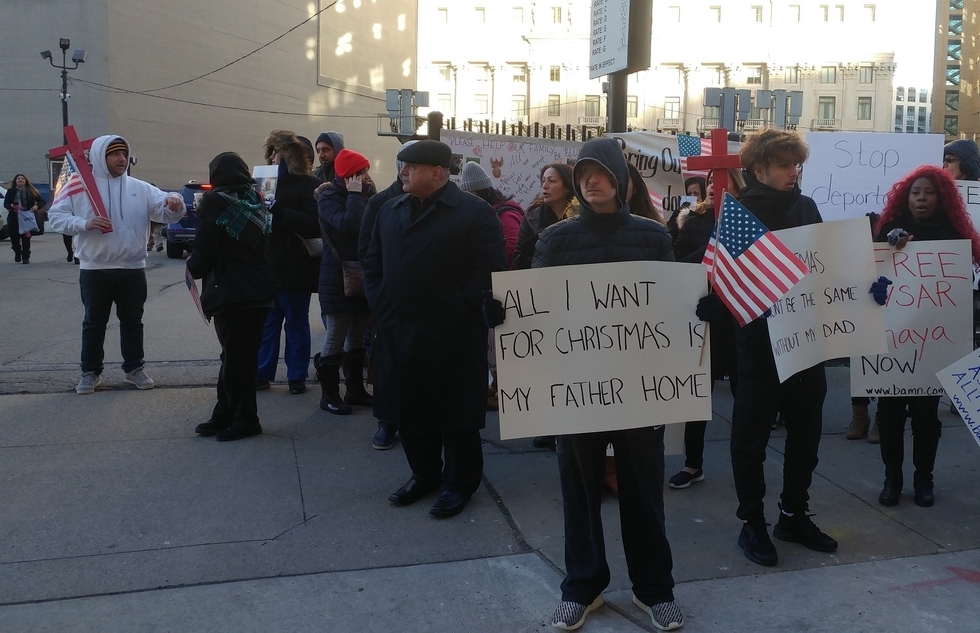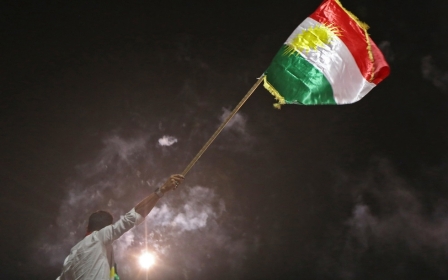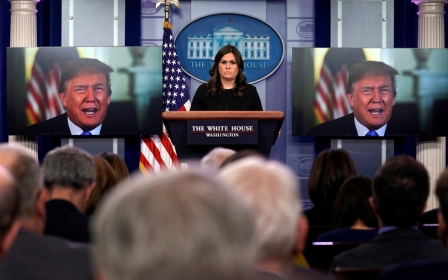US judge orders release of Iraqi immigrant detainees by February

Thirteen-year-old John stood alongside dozens of Iraqis in front of the US courthouse in Detroit last month, holding a sign that read: “All I want for Christmas is my father home.”
John’s father spent the holiday in detention, but on Tuesday a federal judge cleared the way for the release of hundreds of Iraqi immigrant detainees.
A crackdown on Iraqi immigrants facing deportation started in early June after Baghdad agreed to start accepting them. This came in light of a deal struck with the Donald Trump administration that saw Iraq removed from the countries listed on the "Muslim ban".
The government has caused Iraqi families immense suffering by detaining their loved ones unnecessarily for months. Today’s court ruling shows that enough is enough.
- Judy Rabinovitz, ACLU
“What they’re doing is wrong,” John said of US immigration authorities.
Judge Mark Goldsmith ruled in July that the government cannot deport Iraqis without allowing them to plead their case in the legal system because of the dangers they would face in their home country.
Dozens of detained Iraqis come from ethnic and religious minorities; advocates say sending them back to Iraq amounts to a death sentence.
Earlier this week, Goldsmith ruled that the detainees should be granted a chance to return to their families as their cases are being processed.
Detainees are being "deprived of the intimacy of their families, the fellowship of their communities, and the economic opportunity to provide for themselves and their loved ones", the judge wrote.
Appealing deportation is a legally strenuous process that may take years.
Goldsmith ruled that all Iraqi immigrants who have been detained for more than six months should be able to have a bond hearing before 2 February and released unless the government provides compelling evidence that the detainees may run away or pose a risk to the community.
“What they seek is consistent with the demands of our Constitution - that no person should be restrained in his or her liberty beyond what is reasonably necessary to achieve a legitimate governmental objective,” the judge wrote.
'Fundamentally unfair'
The American Civil Liberties Union (ACLU), which is representing the immigrants, welcomed the ruling, saying that the US Immigration and Customs Enforcement (ICE) agency wanted to penalise Iraqis with prolonged detention for fighting for their right to stay in the United States.
"The government has caused Iraqi families immense suffering by detaining their loved ones unnecessarily for months. Today’s court ruling shows that enough is enough," Judy Rabinovitz, deputy director of the ACLU’s Immigrants’ Rights Project, said in a statement.
But ICE voiced dismay at the court’s decision, vowing to appeal it.
“ICE is deeply disturbed by the decision, but will comply with the decision unless and until it is reversed by an appellate court,” the agency said in a statement.
ICE agents have been accused of racially abusing Iraqi immigrants and pressuring them to forego challenging their deportation orders.
At the court hearing in December, a government representative argued that the detainees should remain in custody because of the significant likelihood of their deportation.
For them to continue punishing us just because we are from the Middle East, that’s not right.
- Jon Khoshaba, Iraqi American protester
The judge was not convinced. Goldsmith said there are many possible explanations to the crackdown on Iraqi immigrants, including political motives.
“Maybe someone thought it would look good to detain immigrants,” the judge said.
Rights groups’ lawyers told the judge that keeping the immigrants in detention is causing them “grievous and irreparable harm” without serving any purpose. They stressed the US Constitution’s commitment to liberty.
Miriam Aukerman, senior staff attorney for the ACLU of Michigan, told MEE after the hearing that the government is giving the immigrants two choices: facing death and torture in Iraq or indefinite detention if they choose to exercise their legal rights in the US.
“As long as you’re fighting, we’re going to keep you locked up,” Aukerman said ICE is telling immigrants.
“That’s fundamentally unfair. It’s inhumane, and it’s unconstitutional.”
'No Iraq left'
Most of the immigrants arrested last year had entered the US legally but were later convicted of felonies that violated their visa agreement, making them targets for deportation. Detainees’ supporters say the immigrants have served time in prison and paid their debts to society.
Yani Daoud was born in Greece to Iraqi parents and moved to the US as a child, but he now faces the possibility of deportation over a drug-related offence that he already served time for, his wife Angela said.
“My husband is not a threat to anybody. He only knows America,” she told Middle East Eye before the court session in December.
Dozens of Iraqis had gathered in front of the courthouse on 20 December.
“Don’t take our dads away. Bring them home for the holiday,” they chanted.
Activists pointed to the dire situation in Iraq, saying that their detained loved ones would be persecuted in the war-torn country.
“There’s no Iraq left; even the Iraqi government, they’re hiding in the Green Zone,” Jon Khoshaba, a demonstrator, told MEE last month.
He added that ICE has “destroyed” Iraqi families and made the immigrant community look like a group of criminals.
“You cannot come and punish us twice. This is not the country that we believe in… For them to continue punishing us just because we are from the Middle East, that’s not right,” Khoshaba said.
New MEE newsletter: Jerusalem Dispatch
Sign up to get the latest insights and analysis on Israel-Palestine, alongside Turkey Unpacked and other MEE newsletters
Middle East Eye delivers independent and unrivalled coverage and analysis of the Middle East, North Africa and beyond. To learn more about republishing this content and the associated fees, please fill out this form. More about MEE can be found here.




